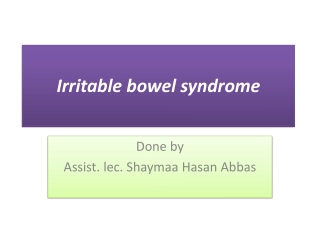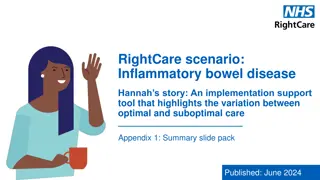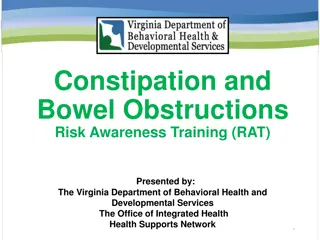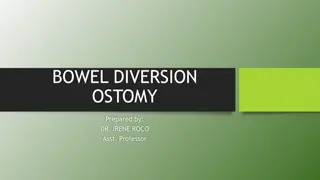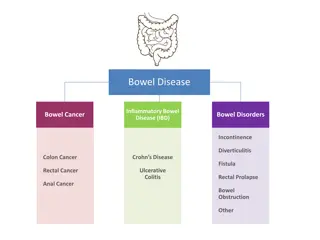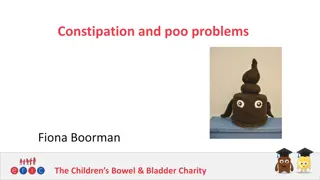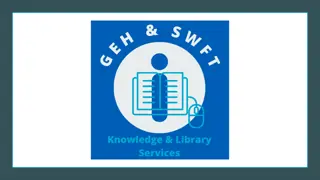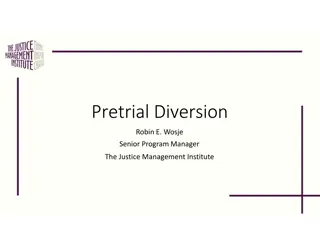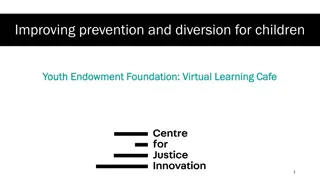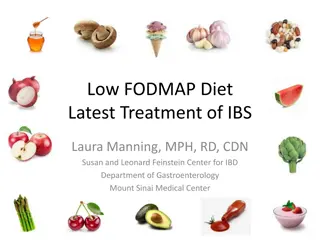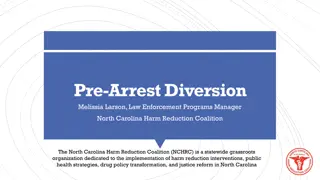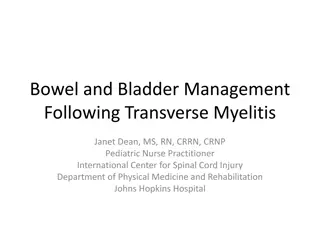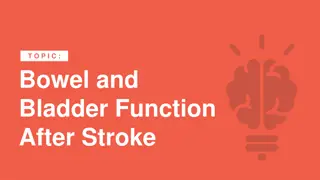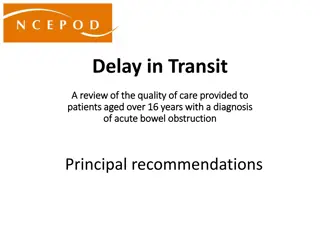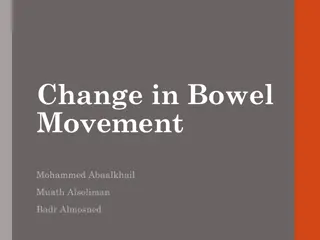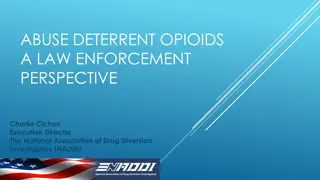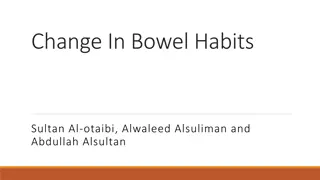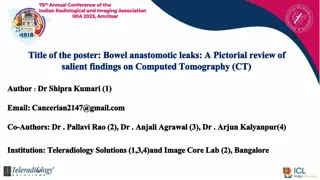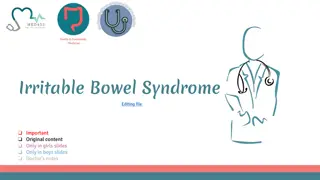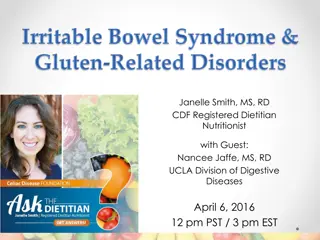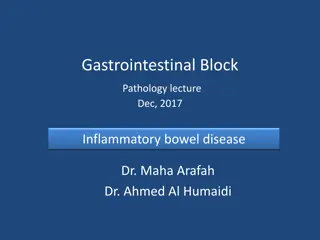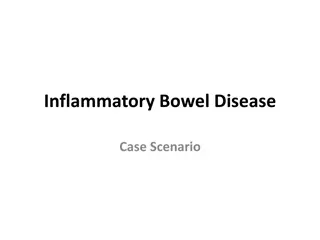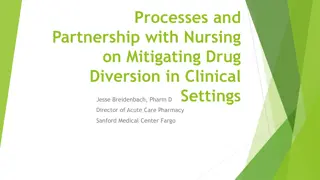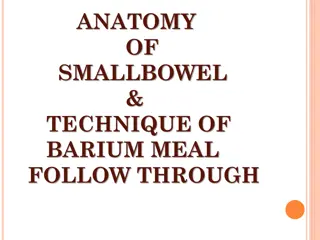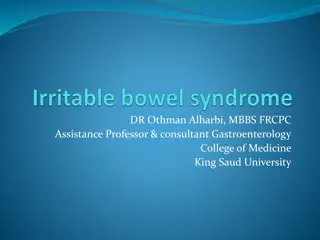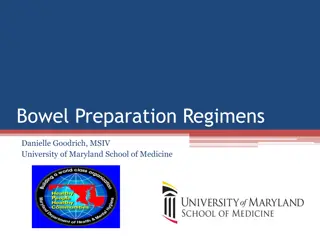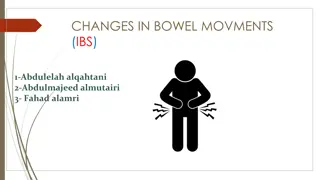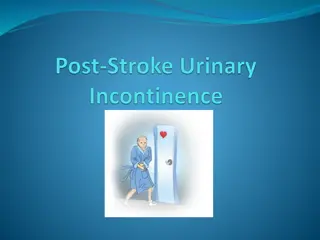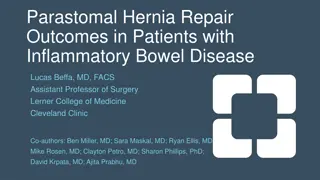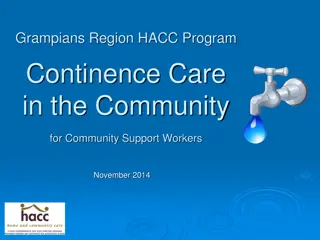Irritable bowel syndrome
Information on the aims of treatment, aggravating factors, treatment timescale, and non-drug and drug treatment options for irritable bowel syndrome (IBS). It also includes a list of relevant medications and their effects.
16 views • 39 slides
Youth Diversion - Annual Report Highlights
The 48th Annual Report of Youth Diversion highlights their mission to help youth overcome challenges by providing prevention, intervention, and educational services. The report includes updates on the board of directors, fundraising efforts, and strategic planning initiatives. Notable achievements i
0 views • 15 slides
Hannah's Struggle with Inflammatory Bowel Disease: A Journey of Challenges and Lessons
Hannah, a vibrant young woman with a bustling social life and active routines, experiences a series of setbacks in her battle with Inflammatory Bowel Disease (IBD). Her journey highlights the importance of timely diagnosis, access to proper care, and comprehensive support services to manage the cond
0 views • 9 slides
Supporting Children and Young People with Learning Disability and Autism in Liaison and Diversion Services
Marie Hunt, Programme Manager, discusses the importance of supporting children and young people with learning disabilities and/or autism in contact with Liaison and Diversion services and Young Offenders Institutions. The research explores key findings, national data, recommendations, and the role o
0 views • 21 slides
Understanding Constipation and Bowel Obstructions Risk
This training program by The Virginia Department of Behavioral Health and Developmental Services focuses on defining constipation, identifying causes and complications, recognizing bowel obstructions, and understanding signs and symptoms of fecal impaction. Caregiver recommendations and the roles of
0 views • 26 slides
Understanding Bowel Diversion Ostomy: Definition, Classification, and Management
Bowel diversion ostomy involves creating an opening in the gastrointestinal tract to divert and drain fecal material. This summary covers the definition, purpose, classification (permanent vs. temporary ostomies, types of intestinal ostomies), management, assessment, and changes associated with osto
0 views • 14 slides
Understanding Bowel Diseases and Their Management
Understanding the causes and mechanisms of bowel diseases such as inflammatory bowel disease (IBD), bowel cancer, diverticulitis, Crohn's disease, and more is crucial for effective treatment. Genetic predisposition, environmental factors, immune malfunction, age-related issues, and lifestyle choices
0 views • 5 slides
Understanding Constipation and Poo Problems in Children
This resource provides insightful information on constipation and related issues in children, including causes, symptoms, treatments, and the impact on bowel and bladder health. It covers various topics such as bowel actions, medications, normal bowel function, and the significance of recognizing an
0 views • 21 slides
Understanding Bowel Cancer: Facts, Prevention, and Awareness Efforts
Bowel cancer, also known as colorectal cancer, is a significant health concern, being the fourth most common cancer in the UK. It is essential to be aware of the symptoms, risk factors, and preventive measures associated with this condition. By maintaining a healthy diet, managing body weight, and s
0 views • 9 slides
Understanding Prosecutor-Led Diversion Programs in Criminal Justice
Explore the various aspects of prosecutor-led diversion programs, including their goals, target populations, and potential challenges. Learn about different models such as Pretrial Diversion and Deflection Models, and access valuable resources for further study and evaluation.
0 views • 12 slides
Enhancing Prevention and Diversion Efforts for Youth Justice Reform
This content discusses the Youth Endowment Foundation's initiatives in improving prevention and diversion strategies for children at risk of entering the youth justice system. It covers the current landscape, areas for improvement such as equal access to diversion, inspection frameworks, data collec
0 views • 43 slides
Effective Implementation of Civil Citation and Prearrest Diversion Programs in Florida
Civil Citation and Similar Prearrest Diversion Programs in Florida provide an alternative to judicial handling for misdemeanor offenses by focusing on preventing further delinquency. Legislative requirements authorize judicial circuits to establish these programs, specifying eligibility criteria, im
0 views • 17 slides
Juvenile Justice Diversion Programs: Principles and Importance
Explore the concept of diversion in juvenile justice, which involves redirecting young offenders away from formal legal proceedings towards community support. Learn about the guiding principles, importance, and various diversion programs at regional and international levels. Understand how diversion
0 views • 15 slides
Understanding the Low FODMAP Diet for Managing IBS
Irritable Bowel Syndrome (IBS) is a common condition that affects millions of people, with symptoms like abdominal pain, bloating, and altered bowel habits. The Low FODMAP diet is a promising approach to managing IBS by reducing certain types of carbohydrates that can trigger symptoms. This diet inv
0 views • 53 slides
Quick Guide to Updating VHASS Diversion, Clinical, and Blood Availability Boards
Accessing and updating the VHASS Diversion, Clinical, and Blood Availability Boards involves a simple 5-step process that should not take more than 2 minutes. Begin by logging into www.VHHA-MCI.org with valid credentials, navigate to the Emergency Operations Page, and contact the RHCC if needed. The
0 views • 6 slides
Understanding Law Enforcement Assisted Diversion (LEAD) Program
Law Enforcement Assisted Diversion (LEAD) program aims to reduce unnecessary involvement in the criminal justice system for individuals with behavioral health disorders. It diverts low-level drug and prostitution offenders to community-based treatment and support services, improving public safety an
1 views • 12 slides
Implementing LEAD Program for Pre-Arrest Diversion in North Carolina
North Carolina Harm Reduction Coalition (NCHRC) implements harm reduction interventions, public health strategies, and justice reform through programs like LEAD (Law Enforcement Assisted Diversion). LEAD diverts low-level drug offenders and sex workers to treatment instead of the traditional crimina
0 views • 7 slides
Bowel and Bladder Management Post Transverse Myelitis
Following transverse myelitis, there can be significant changes in bowel and bladder function, impacting storage, release, and coordination. Neurogenic bowel and bladder issues, differentiated by injury level, can lead to challenges in controlling sphincters and bathroom habits. Understanding these
0 views • 23 slides
Machine Learning for Molten Salt Reactor Safeguards
Molten salt reactors face challenges in material accounting due to liquid fuel which precludes traditional safeguards. This project proposes a two-step approach involving the development of measurement signatures created by material diversion, and a machine learning model to distinguish normal react
1 views • 18 slides
Understanding Irritable Bowel Syndrome (IBS) and Effective Solutions
Irritable Bowel Syndrome (IBS) is a common digestive disorder affecting 1 in 5 people, characterized by symptoms like abdominal cramps, bloating, changes in bowel movements, and fatigue. This condition has various triggers, including infections, stress, and certain medications. Managing IBS involves
0 views • 36 slides
Understanding Bowel and Bladder Issues Post Stroke
Bowel and bladder incontinence are common after a stroke, often due to brain damage affecting control functions. Factors like mobility can exacerbate these issues, leading to discomfort, infections, and other complications. Managing incontinence involves assessing individual needs, recognizing signs
0 views • 10 slides
Review of Care for Patients with Acute Bowel Obstruction: Recommendations and Key Findings
This review assesses the quality of care provided to patients aged over 16 years with acute bowel obstruction. Significant delays were identified in the care pathway, from imaging requests to availability of operating theatres. Recommendations include prompt CT scans with intravenous contrast for de
0 views • 32 slides
Understanding Changes in Bowel Habits and Irritable Bowel Syndrome (IBS)
Changes in bowel habits can indicate underlying conditions like Irritable Bowel Syndrome (IBS), which affects millions worldwide. Learn about the symptoms, diagnosis, and management of IBS through practical examples and multiple-choice questions. Discover how psychological treatments like cognitive-
0 views • 58 slides
Planning a New Prosecutor-Led Diversion Program: Common Issues and Considerations
This presentation explores the concept of diversion, particularly prosecutor-led diversion programs, their history, common issues to consider when planning such a program, and the roles and responsibilities involved. The discussion delves into the meaning of diversion, prosecutor-led diversion, a br
0 views • 28 slides
Opioid Abuse Deterrent Strategies: Law Enforcement Insights
The National Association of Drug Diversion Investigators (NADDI) focuses on combating prescription drug diversion through advocacy, training, and collaboration with law enforcement. They address the misuse of opioids like OxyContin and Oxycodone, showing successes in reducing diversion and deaths in
0 views • 14 slides
Expert Panel on Diversion Planning and Implementation Meeting Report
A detailed overview of the Expert Panel on Diversion Planning and Implementation Meeting including its purpose, composition, authority, and focus on providing technical advice for freshwater and sediment diversion projects, particularly in the Mississippi River and Louisiana restoration efforts. The
0 views • 10 slides
Understanding Change in Bowel Habits and Irritable Bowel Syndrome
This informative content covers topics such as the definition, etiology, and classification of Irritable Bowel Syndrome (IBS), the diagnosis and management of IBS, alarm symptoms to look out for, and when to refer patients to specialists. It also includes a role-play scenario for a focused abdominal
0 views • 33 slides
Bowel Anastomotic Leaks: Salient Findings on CT - Pictorial Review at IRIA 2023, Amritsar
Anastomotic leaks post gastrointestinal surgery can have serious consequences if undiagnosed. This pictorial review presented at the 75th Annual Conference of the Indian Radiological and Imaging Association in Amritsar focuses on the importance of timely CT imaging interpretation for detecting and d
1 views • 10 slides
Understanding Irritable Bowel Syndrome: Pathophysiology, Symptoms, and Management
Irritable Bowel Syndrome (IBS) is a common gastrointestinal condition with uncertain pathophysiology involving factors like motility, hypersensitivity, inflammation, and gut microflora. Symptoms include abdominal pain, altered bowel habits, and bloating. Diagnosis is based on Rome IV criteria, and m
0 views • 9 slides
Understanding Irritable Bowel Syndrome (IBS), FODMAPs, and Gluten-Related Disorders
This webinar discusses the relationships between Irritable Bowel Syndrome (IBS), FODMAPs, and gluten-related disorders, covering topics such as the definition of IBS, its relationship with Celiac Disease and Gluten Sensitivity, the Low FODMAP diet, and functional gut disorders. Functional GI symptom
0 views • 24 slides
Understanding Inflammatory Bowel Disease: Crohn's Disease and Ulcerative Colitis
Inflammatory Bowel Disease (IBD) encompasses Crohn's disease (CD) and ulcerative colitis (UC), chronic conditions with immunologic basis. This article delves into the epidemiology, pathophysiology, and differences between CD and UC, highlighting clinical features, pathology, and complications like a
0 views • 42 slides
Inflammatory Bowel Disease Case Study: Diagnostic Challenges and Treatment Decision
A 56-year-old male with a history of inflammatory bowel disease presented with severe symptoms necessitating hospitalization. Despite steroid therapy, lack of improvement led to consideration of a total colectomy. Colonoscopy and biopsy results favored ulcerative colitis over Crohn's disease. This c
0 views • 31 slides
Strategies for Mitigating Drug Diversion in Clinical Settings
Strategies for preventing drug diversion in clinical settings are crucial for patient safety and workplace integrity. The presentation by Jesse Breidenbach, Pharm.D., explores successful structures, myths, and the prevalence of drug diversion in healthcare. It emphasizes the need for tight control o
0 views • 31 slides
Understanding Small Bowel Anatomy and Barium Meal Technique
Exploring the anatomy of the small bowel, including the duodenum, jejunum, and ileum, as well as the technique of a barium meal follow-through. The small bowel is a convoluted tube extending from the pylorus to the ileocecal valve, averaging 6-7 meters in length. The duodenum, characterized by its C
0 views • 34 slides
Understanding Irritable Bowel Syndrome and Its Pathophysiology
Irritable bowel syndrome (IBS) is a common gastrointestinal disorder characterized by chronic abdominal pain and altered bowel habits. Despite the absence of organic causes, patients experience symptoms such as abdominal distention, bloating, and visceral hypersensitivity. The pathophysiology of IBS
0 views • 19 slides
Bowel Preparation Regimens for Colorectal Cancer Screening
Overview of bowel preparation regimens for colorectal cancer screening, emphasizing the importance of adequate bowel cleansing to enhance the effectiveness of colonoscopy. Highlights the impact of different dosing regimens on patient compliance, colon cleansing, and detection rates of small polyps.
0 views • 20 slides
Understanding Irritable Bowel Syndrome: Symptoms, Diagnosis, and Management
Define constipation and diarrhea, discuss the definition, etiology, and classification of IBS, explain how to diagnose IBS, list alarm symptoms and differential diagnosis, provide a management plan and follow-up, and recognize when to refer to a specialist. People with irritable bowel syndrome may s
0 views • 35 slides
Stroke Continence Protocols for Managing Bladder and Bowel Function After Stroke
This protocol outlines the management of urinary and bowel incontinence in stroke patients, emphasizing high nursing care levels and avoiding unnecessary catheterization. It discusses normal bladder functions, urinary dysfunction prevalence post-stroke, and interventions for promoting continence. Ur
0 views • 30 slides
Outcomes of Parastomal Hernia Repair in Inflammatory Bowel Disease Patients
This study examines the outcomes of parastomal hernia repair in patients with inflammatory bowel disease, specifically comparing outcomes between those with Crohn's disease and ulcerative colitis. The research, conducted from 2012 to 2022, analyzes data from 392 patients, highlighting factors such a
0 views • 16 slides
Understanding Continence Care in the Community
Continence care in the community focuses on maintaining normal bladder and bowel functions to support individuals in managing their toileting needs effectively. Continence involves being aware of bodily signals, knowing when and how to void or defecate, managing clothing, storing urine or bowel move
0 views • 38 slides
